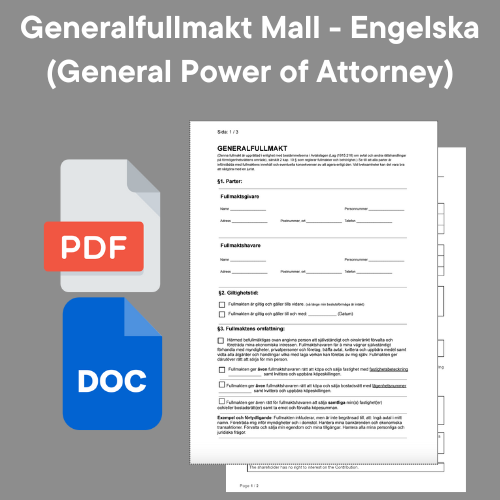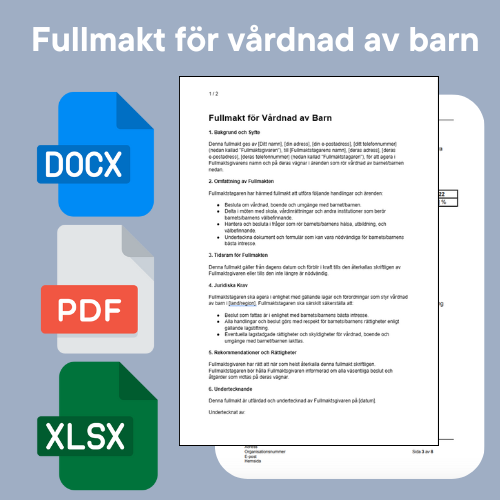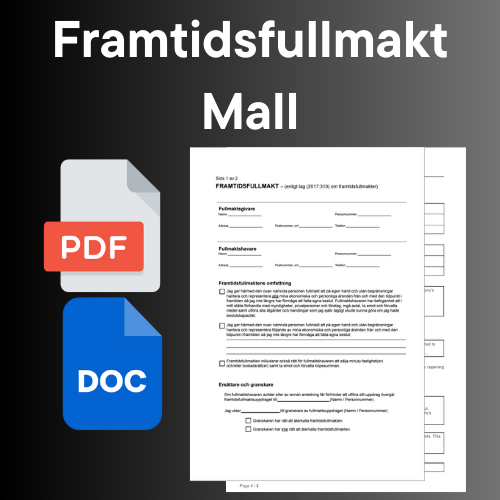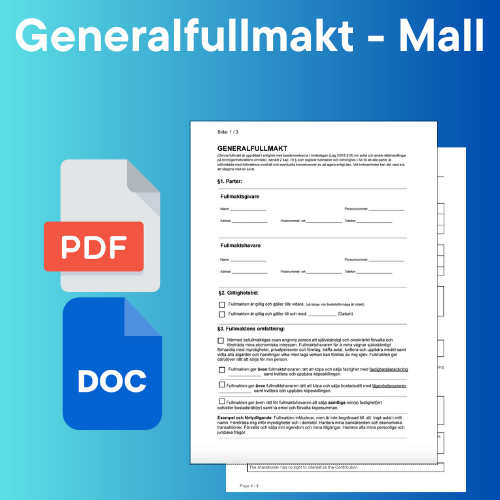Frequently Asked Questions about Powers of Attorney (FAQ)
Share
A Comprehensive Guide to Frequently Asked Questions about Powers of Attorney
Introduction
A power of attorney is a legal document that gives one person (the power of attorney) the right to let another person (the power of attorney) act on his behalf. Powers of attorney are often used in situations where, for various reasons, the person giving the power of attorney cannot be present in person to make decisions or carry out actions. There are several different types of powers of attorney, each with their specific uses and requirements.
Table of Contents
- Introduction
- Types of Powers of Attorney
- Form requirements and Validity
- Common questions and answers
- Conclusion
Introduction
A power of attorney is a legal document that gives one person (the power of attorney) the right to let another person (the power of attorney) act on his behalf. Powers of attorney are often used in situations where, for various reasons, the person giving the power of attorney cannot be present in person to make decisions or carry out actions. There are several different types of powers of attorney, each with their specific uses and requirements.
Types of Powers of Attorney
Simple Power of Attorney
Simple Power of Attorney: Used for specific tasks such as selling a car or voting at an association meeting. The power of attorney ceases to apply after the task is completed.
Future power of attorney
Future power of attorney: Begins to apply when the power of attorney can no longer make decisions himself, for example due to illness. This power of attorney is an alternative to appointing a good man or trustee.
General power of attorney
General power of attorney: Gives the power of attorney broad powers to act in all matters that the power of attorney could handle himself.
Power of attorney
Power of attorney: Linked to a certain position, for example an employee's right to make purchases on behalf of the company.
Power of tolerance
Power of tolerance: Occurs when a person has repeatedly acted as a power of attorney and this is expected to continue.
Combination power of attorney
Combination Power of Attorney: Used in situations where several circumstances combine to create a power of attorney, even though no single circumstance would be sufficient on its own.
Power of Attorney (Prokura)
Power of Attorney (Prokura): Gives a person the right to represent a company in financial and legal matters.
Form requirements and Validity
A power of attorney can be drawn up both in writing and orally, but written powers of attorney are preferred for the sake of clarity and evidence. For certain specific types of powers of attorney, such as property purchases and future powers of attorney, written form and sometimes also witnessing is required. It is also wise to specify a validity period to avoid misuse.
Common questions and answers
What is the difference between different types of powers of attorney?
Powers of attorney can be specific (e.g. simple power of attorney for a specific task) or broad (e.g. general power of attorney giving the holder extensive powers). Future powers of attorney take effect upon future events such as inability to make decisions for oneself, while a standing power of attorney is tied to a specific position or role.
How can you ensure that the power of attorney is valid and approved?
To ensure that a power of attorney is valid, it should be in writing and clearly state the names and social security numbers of the parties, the extent of the powers and any time limit. Although witnessing is not always required, it can increase the credibility and acceptability of the document.
What happens if the council can no longer act?
It is important to specify in the power of attorney a replacement who can take over if the original power of attorney is unable to perform his duties. If no replacement is specified, the power of attorney may himself appoint someone to handle the necessary measures.
How should the power of attorney be formulated legally?
A legally correctly worded power of attorney should contain the name and social security number of the person giving the power of attorney and the holder of the power of attorney, specification of the powers granted, date and place of issuance, as well as the signatures of any witnesses. It is also good to include a time limit.
What powers should the power of attorney have?
The powers should be adapted according to the need. A simple power of attorney can be limited to a specific task, while a general power of attorney gives extensive powers. Future powers of attorney should clearly state which areas the power of attorney may act in, for example financial and personal matters.
Who should be appointed as authorized representative?
It should be a person whom the authorizer trusts and who has sufficient competence to handle the tasks in question. For future powers of attorney, it may also be wise to appoint an auditor who can monitor the actions of the power of attorney.
What is the difference between a power of attorney and a will?
A power of attorney gives someone the right to act in the name of the power of attorney while he is alive, while a will regulates how the deceased's assets are to be distributed. A future power of attorney can continue to apply even after the death of the power of attorney if this is specifically stated in the power of attorney.
Who needs to know about the power of attorney and how do I inform them?
It is important to inform all relevant parties such as banks, authorities and other organizations that may need to accept the power of attorney. Copies of the power of attorney should also be shared with close relatives and any reviewers.
What are my rights and obligations as a proxy?
The person giving the power of attorney has the right to revoke the power of attorney at any time and to receive an account from the holder of the power of attorney on how the powers are used. It is also the responsibility of the person giving the power of attorney to clearly articulate what powers are given and to choose a reliable power of attorney.
How do I ensure that the power of attorney is valid in other countries, if I need it?
If the power of attorney needs to be valid internationally, it may be required that it be drawn up according to the specific requirements of the country where it is to be used. This may mean that it needs to be legalized or apostilled.
What happens if I don't have a power of attorney and can no longer make decisions myself?
If a person does not have a power of attorney and becomes unable to make decisions himself, a trustee or administrator may need to be appointed by the district court. This can lead to more bureaucracy and less control for the individual.
What is the difference between a power of attorney and a power of attorney?
A power of attorney is the document itself that gives authority, while the holder of the power of attorney is the person who gets the right to act according to the power of attorney.
How can I be sure that the power of attorney is acting in my best interests?
The power of attorney can appoint an auditor to monitor the actions of the power of attorney and request regular reports. If the holder of the power of attorney abuses his powers, he can be held responsible and the power of attorney can be revoked.
What is the responsibility of a power of attorney if the power of attorney misuses its powers?
The person giving the power of attorney is responsible for revoking the power of attorney if abuse is discovered. It is also important to carefully choose a reliable person as power of attorney from the beginning and to specify clear limits and requirements in the power of attorney.
How long is a power of attorney valid?
The validity period of a power of attorney should be specified in the document. If no time limit is specified, the power of attorney is valid until it is revoked. Future powers of attorney often continue to apply even after the death of the power of attorney, unless otherwise stated.
What happens if I cannot sign a power of attorney myself?
If the person giving the power of attorney cannot sign himself, a power of attorney can be drawn up with the help of witnesses or a notary who can confirm that the person giving the power of attorney approves the content.
Can I have several authorized representatives at the same time?
Yes, it is possible to appoint several authorized representatives. In that case, it should be clearly stated how their powers are distributed and whether they should act together or separately.
What should I do if I lose my power of attorney?
If the power of attorney is lost, the power of attorney should immediately inform all affected parties and, if necessary, draw up a new power of attorney. It may also be appropriate to issue a formal revocation of the lost power of attorney to avoid abuse.
How can I ensure that my power of attorney is valid and complies with the requirements of the law?
To ensure that the power of attorney is valid and complies with the requirements of the law, you should check that all the necessary information is correctly filled in, that there are clear instructions about powers, and that any witnessing is correctly carried out.
Who can witness or certify a power of attorney?
The witnesses should be two independent persons who are of legal age and have no personal gain in the power of attorney. It is important that the witnesses understand the meaning of the document and that they can certify that the person giving the power of attorney was sane when signing.
Conclusion
Establishing a power of attorney can be an important measure to ensure that your affairs can be managed according to your wishes even if you are unable to do so yourself. By understanding the different types of powers of attorney and their specific requirements, you can create a power of attorney that is both valid and effective. Be sure to include all necessary information, choose a trusted power of attorney, and consider appointing an auditor to further protect your interests.




